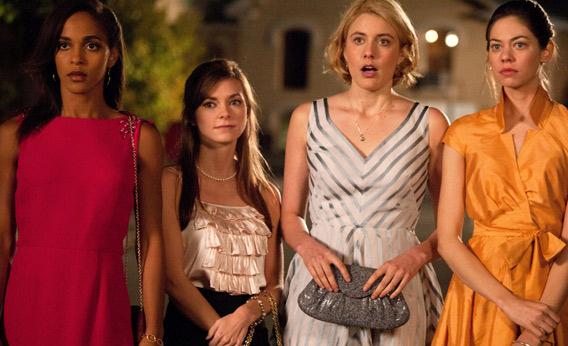bechdel taser: coherency in distress
 Well, it’s a quirky indie comedy time of year. My opinion of such flicks varies wildly. I loved I Heart Huckabees so much that I spent the Summer holidays between Year 8 and 9 learning about existentialism and Lily Tomlin. I hated (500) Days of Summer in the sense that I had to have three windows open on my computer while “watching” it, to avoid falling asleep.
Well, it’s a quirky indie comedy time of year. My opinion of such flicks varies wildly. I loved I Heart Huckabees so much that I spent the Summer holidays between Year 8 and 9 learning about existentialism and Lily Tomlin. I hated (500) Days of Summer in the sense that I had to have three windows open on my computer while “watching” it, to avoid falling asleep.
Damsels in Distress falls in the middle. It’s too long. There are entire plot lines that could have been shelved. There are too many sub-plots and too little plot. There are times when it’s tongue-in-cheek, and times when it’s licking its own arse cheeks.
I think it’s a satire of manners. Set at a university, it was at times, a fun house mirror of things that could vaguely potentially happen and a few issues dealt with at actual tertiary institutions. Things like “depression is a thing” and “so are colleges”. There are four girls, each named after a plant (Lily, Heather, Violet, Rose). The trailer makes it look coherent—a grown up version of Sally Draper slash Cher’s mother in Clueless (Violet) is saving barbaric, uncool boys from themselves, with the help of two sidekicks and a girl taken under their wing. They are also misguiding the suicidal and seriously depressed with absurdly useless tactics. But the film fixates on sub-plots within this, like bars of soap and religiously motivated anal sex (not connected).
It’s one part Stepford, one part Mean Girls, and the most feminised stoner movie I’ve ever seen. That’s a good thing; those flicks are generally festivals of sausage. In the film’s first forty minutes, every line turns into a tangent. I like the way it uses language and that so many of its ideas are left-field. There’s a running sub-plot about a frat boy so stupid he doesn’t understand colours and broke down in front of a rainbow. The dim-witted Heather discusses it with razor sharp WOC Rose, asking if she can imagine never being aware of colour. The deadpan faux-Brit bites that she absolutely cannot, and the double meaning is never explained.
The biggest tangent of the film is Violet’s emotional… not journey, unless you take the wanky high-school “themes” meaning of the word and explore how a journey is not about its destination. The head of the suicide prevention service deals with the seriously depressed, but even after self-identifying as mad, refuses to use the term, preferring “in a tailspin”. Though her behaviours are archaically ridiculous, many with the condition might relate to the moderated/empty impression she gives. It’s a great performance, but the character does not stand up to the screen time. Her motivation is flimsy and unconvincing—in the style of the best musicals, she wants to start a dance craze. This, however, is given less precedence than many of the supplementary subplots and emotional turmoils. Really, had the film made itself more of a musical, the prevailing mood and sarcastic retro concepts would have been dynamic and well-glued. It has a resemblance to Reefer Madness, if you squint.
The only seriously cool thing it did plot-wise was focusing on Violet’s emotions after a relationship break-down, rather than the relationship’s nuts, bolts and failure to work an Allen Key. It’s like reverse fridging—the trope where a (usually) male’s (usually) female partner will die and the film will focus on the surviving man, rather than the loss of the woman.
Damsels passes the Bechdel Test. Heterosexual relationships are one of the mannered gendered norms the film skewers to the point of making straight people look wrong-in-the-head. But it doesn’t ignore anything else your grandmother would refer to as “moral fibre”. There’s probably a lot to say about their specifics. But it would take a good dozen or so viewings for me to untangle them in a way that will sound coherent here. It’s probably worth seeing if you’re into making kebabs of gender tropes and then instead of cooking them, sticking them to a wall and watching a bunch of birds make merry. But maybe see it on DVD, where you can take it in smaller doses and write down the really good lines. I did, but I mis-spaced my writing so every note was written over something else. Which is a good metaphor for the film, really.

